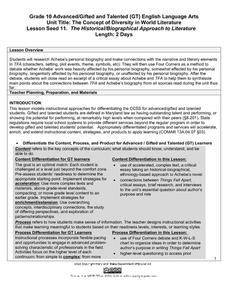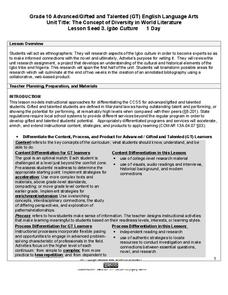National Endowment for the Humanities
Chinua Achebe's Things Fall Apart: Oral and Literary Strategies
Readers are first introduced to Chinua Achebe's Things Fall Apart by making a map of Africa. They will better understand the novel's historical and literary contexts, European and African literary traditions, and how historical events...
Curated OER
Fall Reflections Monoprints
Create a natural autumn scene using the monoprinting method. Class members work on creating an image with reflection, foreground, and background using one line.
Curated OER
Lesson Plan 6: Introducing the Elements of Plot-Part Two
November is National Novel Writing Month, so if your young authors are embarking on this journey, be sure they understand plot elements. This collaborative instructional activity fits into the context of the larger NaNoWriMo project;...
Maryland Department of Education
The Concept of Diversity in World Literature Lesson 12: Author's Purpose - Yeats and Achebe
Is there such a thing as fate/luck? Can one fight destiny? As part of their study of Chinua Achebe's purpose in writing Things Fall Apart, class members answer these questions from Achebe's point of view and then from William Butler...
Curated OER
Adjectives About the Fall Season
In this recognizing descriptive words worksheet, students write adjectives about the fall season and the color change in leaves and then create sentences using the adjectives.
Curated OER
Picture Sentences About Fall
In this literacy worksheet, 3rd graders pick the five sentences that are grammatically correct focused upon the theme of Fall. The answers are found on page 2.
Curated OER
What?s in a Picture? an Introduction To Subject in the Visual Art
Students identify clues that tell them about where, when, who and what they are seeing in art images. They work, step by step, through the layers of meaning, delving more deeply into these layers with each work as they progress through...
Poetry4kids
How to Write a Limerick
Add a little fun and fancy to English language arts with an activity that challenges scholars to write a limerick. Authors follow five rules in order to compose an original poem that contains a specific rhyme scheme.
Curriculum Corner
November Bell Ringers
All things November in a set of 32 bell ringer ideas to get you through the month. From writing about November to writing about colors and feelings in fall, these bell ringers are fun and allow creative writing practice.
All-in-One High School
Elements of Plot
Cinderella wants to go to the ball and marry the prince. At the end of the story, she does! But how does the plot move from the exposition to the resolution? Teach language arts learners and fairy tale fans about the basics of plot...
Curated OER
Autumn Internet Hunt
Which is better for a harvest party, apple juice or apple cider? Are there many black bears in your state? How soon in advance do you need to plant pumpkins in order for them to be ready by October? Find the answers to these questions...
Maryland Department of Education
The Concept of Diversity in World Literature Lesson 10: Author's Purpose Seminar
Why did Chinua Achebe write "An Image of Africa: Racism in Conrad's Heart of Darkness" in response to Conrad's novel? As part of a study of Things Fall Apart, class members conduct a socratic seminar focused on Achebe's purpose and...
Maryland Department of Education
The Concept of Diversity in World Literature Lesson 11: The Historical/Biographical Approach to Literature
How affected is Thinks Fall Apart by Chinua Achebe's personal biography? Using a four corners strategy, and evidence from their readings, class members debate the degree of biographical influence in Achebe's novel.
Maryland Department of Education
The Concept of Diversity in World Literature Lesson 9: Debating Imperialism
To gain an understanding of Imperialism, class members read Rudyard Kipling's poem, "The White Man's Burden" and Mark Twain's essay, "To the Person Sitting in Darkness." Groups compare these perceptions of non-white cultures with the...
Maryland Department of Education
The Concept of Diversity in World Literature Lesson 7: Cultural Commentary
As part of their study of Things Fall Apart, class groups develop a multimedia presentation in response to the question, "In what ways does Achebe use literature as a means to express and comment on culture and history?"
Maryland Department of Education
The Concept of Diversity in World Literature Lesson 1: Unit Introduction
To launch a unit study of the concept of diversity in World Literature, class members compare Chinua Achebe's essay, "An Image of Africa: Racism in Conrad's Heart of Darkness" and Richard Rodriguez's essay, "The Chinese in All of Us: A...
Maryland Department of Education
The Concept of Diversity in World Literature Lesson 3: Igbo Culture
What cultural concepts must readers understand in order to connect to Things Fall Apart? As part of their study of Chinua Achebe’s novel, class members research Nigeria and the Igbo culture to create a collaborative, web-based, annotated...
Maryland Department of Education
The Concept of Diversity in World Literature Lesson 4: Proverbs
"Eneke the bird says since men have learnt to shoot without missing, he has learnt to fly without perching." As part of their study of Things Fall Apart, class members read Paul Hernadi and Francis Steen's essay, "The Tropical Landscapes...
Bulgarian Creative Writing Competition
Creative Writing Prompts For Every Season and Month
Winter, spring, summer, and fall! Every season is covered in a 14-page list of writing prompts. Included are story starters, reflection questions, poetry topics, and more.
Soft Schools
Plot — 3rd or 4th Grade
After reading a version of "The Tortoise and the Hare," scholars complete a plot diagram. They pinpoint the tale's beginning, rising action, climax, falling action, and ending.
Dr. Seuss Enterprises
Read Across America
Celebrate the whimsical world of Dr. Seuss on Read Across America Day with a collection of science, technology, engineering, the arts, and mathematics activities, each linked to a popular Dr. Seuss story.
K12 Reader
Phases of the Moon
Take one giant leap for mankind with a reading passage about the moon. Kids learn about the lunar cycle with context clues and reading comprehension questions, making it a good informational text for your language arts lesson.
K12 Reader
What’s the Forecast?
A reading comprehension passage is illustrative for both language arts and earth science skills. Using context clues, learners find out how to predict the weather using various tools. They then answer five reading questions about what...
Teach-nology
Editing Informal Letters
Editing a letter isn't quite the same thing as fixing an autocorrected word on your phone, but it's an important skill that can help kids with their language arts skills. Young readers take a look at a short letter before identifying the...
Other popular searches
- Fall Art Lesson Plans
- Fall Art Projects
- Art With Fall Leaves
- Art Watercolor Fall Leaves
- Fall Art Activities
- Preschool Fall Art
- Fall Art Lessons
- Fall Art Ideas
- Fall Autumn Art Projects
- Fall Art Landscapes
- Fall Art and Poetry
- Fall Art Projects Paint

























